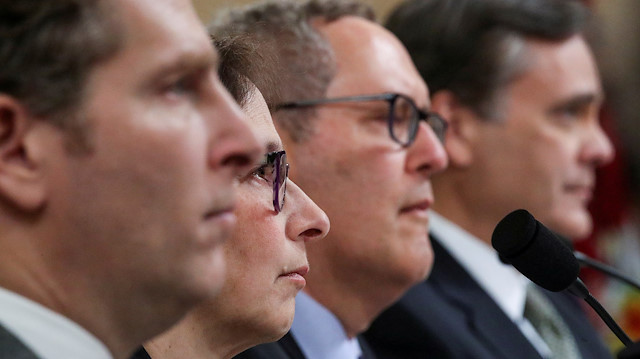
Republicans seek to draw out hearing, repeatedly seeking roll call votes
The House of Representatives Judiciary Committee opened its first impeachment hearing into U.S. President Donald Trump on Wednesday as Republicans sought to draw out the process with repeated parliamentary motions.
Committee Republicans placed several motions before the committee that when tabled required a roll call vote under committee rules with each member on the panel having to individually voice their support or dissent. All of the motions have been met with party-line votes, and were rejected by the Democratic majority.
The hearing is centered on testimony from legal experts who are examining whether Trump's repeated requests to Ukrainian President Volodymyr Zelensky to publicly declare criminal investigations, including into Democratic challenger Joe Biden, rise to the level of "high crimes and misdemeanors," the bar set for impeachment.
Democrats have called three witnesses to testify Wednesday, among them, Pamela Karlan, a professor at Stanford Law School; Michael Gerhardt, a constitutional law professor at the University of North Carolina; and Noah Feldman, a professor at Harvard Law School.
Republicans called George Washington University Law School professor Jonathan Turley.
All of the Democratic witnesses testified that the president carried out impeachable offenses with Karlan saying Trump has "doubled down on violating his oath to 'faithfully execute' the laws and to 'protect and defend the Constitution.'"
"If we are here to keep faith with the Constitution and our Republic, President Trump must be held to account," she said.
Turley, however, said the case against Trump is "slipshod," questioning the impacts of Trump's impeachment on future commanders-in-chief.
"It is not wrong because President Trump is right," he said in a 53-page written testimony before the committee. "His call was anything but 'perfect' and his reference to the Bidens was highly inappropriate."
But, Turley said, "It is wrong because this is not how an American president should be impeached."
The House's impeachment investigation is centered on Trump's multiple requests to Zelensky to declare criminal investigations into Biden and his son, Hunter, as well as claims that it was Ukraine, not Russia, who meddled in the 2016 election.
Also at issue is the holdup of $400 million in congressionally appropriated military aid to Ukraine and whether Trump conditioned the release of that assistance and a possible Oval Office meeting with Zelensky on the Ukrainian president publicly announcing the investigations.
Trump has repeatedly lashed out at the impeachment probe as a "witch hunt" and denied wrongdoing, ordering his top officials not to participate in the proceedings.
Roughly a dozen witnesses have offered sworn public testimony before the Intelligence Committee.





